Peter MALONE
Saturday, 18 September 2021 19:59
Carol
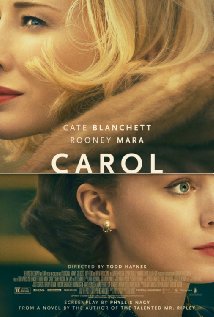
CAROL
US, 2015, 118 minutes, Colour.
Cate Blanchett, Rooney Mara, Kyle Chandler, Sarah Paulson, Jake Lacy, John Magaro.
Directed by Todd Haynes.
It is something of a surprise to find that the novel on which this film is based is by Patricia Highsmith, best known for her thrillers, including Strangers on a Train, filmed in 1951 by Alfred Hitchcock, the period in which this story is set.
The early 1950s were considered to be a rather calm period in American society – at least with what was to follow in the 1960s. Sexual orientation was not an issue that was discussed in public. This is the context of Carol’s story.
Carol is a wealthy middle-aged woman, divorced but with a little daughter, in some ways subdued by her dominant husband and his family, but seeking some kind of independence, especially in a relationship with Abby, a friend from school days. Her husband and his parents see this as an aberration and encourage her to therapy.
The other central character is a younger woman, Therese, who works in a department store. One day she is attracted by the very well-dressed, demure but assured Carol, sells her a train set as a gift and contrives to return to her the gloves that Carol had misplaced in the store. This leads to a meeting, to a lunch, to a relationship that is significant for both women.
Her husband is able to hold over Carol the threat of not being able to see her daughter. Nevertheless, she goes on a cross-country car ride with Therese. Her husband has not given up on her and the couple is surprised at a motel in the midwest. Carol is compliant, wanting to see her daughter, and her friend, Abby, flies out to bring Carol back to New York.
Can there be a future for the couple? Can Carol be assertive about herself as well as her demands on seeing her daughter? Can Therese move on and find a life on her own?
Over the years, director Todd Haynes has explored aspects of sexual orientation and relationships, especially in Far From Heaven with Julianne Moore and Dennis Quaid, again set in the 1950s and, as with this film, styled, costumes and decor and make up, and photographed in the modes of the period. In some ways this distances the audience from the situation, looking back and making responsive judgements and only then reflecting on the issues of same-sex relationships in the 21st century.
Rooney Mara as Therese won the best actress award at the 2015 Cannes film Festival. But, it is Cate Blanchett who is centre screen as Carol, which many say is Cate Blanchett’s career-best (but they tend to say that about each of her performances). Sarah Paulson is Abby.
The film is meticulously produced, very fine in its performances, paced in a way that allows us to enter into the two characters, appreciate their needs, their attitudes, the relationship.
1. Acclaim for the film, awards?
2. The director, the themes of his filmmaking, his portrait of women, his pictures of sexual issues and themes and confusion?
3. The original story, written by Patricia Highsmith, her career in thriller writing? The story of the 1950s?
4. The cast, the strength of performances?
5. The colour photography, emulating the styles of films of the 1950s, the Eisenhower era,
Costumes, decor, homes, shops, restaurants? The cross-country drive, the motels? A film of the times and the technique of immersing the audience in the times?
6. The title, the focus? Carol, her relationship with Therese?
7. The initial scene, Carol and Thérèse together, in the restaurant, their discussion, Richard arriving, the social, Therese going, Carol letting her go? The flashbacks and returning to this sequence at the end?
8. The lesbian theme, the 1950s, the 21st century perspective, greater openness, audiences and attitudes, story, characters, drama, personal situations, moral situations, emotions and understanding?
9. Cate Blanchett as Carol, her age, experience, a woman of poise, control, yet vulnerable? The marriage, tense relationship with her husband, their meetings, home life, the lifestyle, the mansion, the devotion to her daughter? The motives for her marrying? Her relationship with Abby, from childhood, the sexual relationship, the end of the affair? The continued friendship, meetings, Abby helping her, Harge and his visit to her demanding to see Carol, her flying and collecting Therese and bringing her back to New York?
10. The initial impression of Thérèse, in the scene with Carol, her relationship with Richard? Talking to Carol, going to the party, Richard giving a lift? A different perspective when the scene is repeated at the end?
11. In the shop, the Santa hat, the staff, sales, Therese seeing Carol, the discussion about the train set and the sale, the gloves left behind, her getting them to Carol, the effect on Carrol? The looks between the two women? Carol’s appreciation, coming again, setting up the meetings?
12. The two falling in love, the bond between them, Thérèse and her explanations of Carol, to Richard, Danny, their attention to her? Her not able to respond to the men except in friendship?
13. The pressure on Carol, the decision to take the trip, the detail of the car rides, the countryside, the various motels, the buildup to the sexual encounter?
14. The phone calls, Harge and his search? The guest at the motel, talking, the photography, the revelation that he was a detective, nothing personal, sending the photos to Harge?
15. Carol, leaving, and Abby coming to get Thérèse? Carol at home, breaking of contact, going to visit her husband’s parents, the formalities and discussions, propriety? The prospect of losing her daughter, reunited with her? Going to the counsellor, saying the treatment was effective?
16. Going to the lawyers, Carol asserting herself, the issue of the deals, visitation rights?
17. Carol inviting Thérèse, their talking, the recurring of the initial sequence, Therese leaving, going to the party, at the party, making her decision? The return to the restaurant? Seeing Carol, her charm and aplomb, with people? Therese standing, Carol seeing her? The decision?
18. The audience emotions at the end of the film?
Published in Movie Reviews
Published in
Movie Reviews
Tagged under
Saturday, 18 September 2021 19:59
Inglorious Bastards
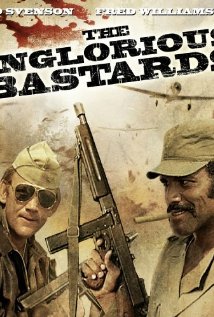
THE INGLORIOUS BASTARDS/QUEL MALEDETTO TRENO BLINDATO
Italy, 1978, 99 minutes, Colour.
Bo Svenson, Peter Hooton, Fred Williamson, Michael Pergolani, Jackie Basehart, Raimund Harmstorf, Ian Bannen.
Directed by Enzo G.Castellari.
This film had a popular cult reputation, a kind of spaghetti World War II film from Italy and director Enzo G. Castellari. One of the reasons for its fame was its being liked by Quentin Tarantino and his using it as a jumping off point for his own Inglourious Basterds that – a much more ingenious and thoughtful film than the original, though with plenty of Tarantino violent touches.
The setting is France in 1944, an American base, the rounding up of American military criminals, deserters, murder is… They are certainly an inglorious bunch. Their leader is an officer, a pilot played by Bo Svenson, who has disobeyed orders and flown to see his girlfriend in England several times. There is a racist mobster played by Peter Hooton, an African- American played by Fred Williamson. There is a conman thief, Nick, who nicks everything in sight and out of sight, played by Michael Pergolani. Jackie Basehart is fearful soldier. Raimund Harmstorf is a German soldier whom they capture but who contributes to their escape. And Ian Bannen is the Colonel in charge of the mission to recover a Nazi warhead on a train.
There are lots, lots, of shootout sequences with the inglorious group able to mow down Nazi soldiers galore – except the end when they are willing to give their lives for the cause.
They are strafed by a plane and then taken over command sending the MPs running. In various encounters, they use their wits and machine guns which seem always to become rapidly available.
In the meantime, there are racial tensions between the Chicago gangster type and the African- American, some pretty mean dialogue given to the gangster. He also is ready to kill the German soldier they take prisoner but who was able to help them along the way, deceiving groups of the Germans.
They make their way towards the Swiss border and come across a group of Resistance and pretend to be the group that they are expecting. There is a moment of romance – of all people with the American gangster.They are introduced to the Colonel, he sees through them and, reluctantly, takes them on their mission which includes their feigning being captured, moving on to a train, taking over the train, and the Colonel able to get his warhead. However, their time has run out and they are shot contributing to the cause.
A film more than 30 years after the events, memories of those old war films – and the use of the violent action conventions that characterised the spaghetti Westerns of the 1960s and 70s.
Published in Movie Reviews
Published in
Movie Reviews
Tagged under
Saturday, 18 September 2021 19:59
Dead Lands, The
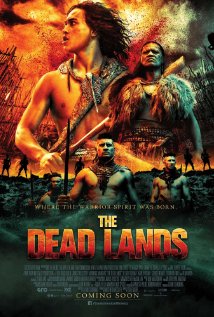
THE DEAD LANDS
New Zealand, 2014, 107 minutes, Colour.
James Rolleston, Lawrence Makaore,Te Kohe Tuhaka, Xavier Horan, George Henare, Rena Owen.
Directed by Toa Fraser.
The Dead Lands take place in the past history of the Polynesians who settled the islands of New Zealand, the Maori tradition. The film is principally a cultural story about tribes, conflicts, revenge and the fulfilment of vengeance.
The film shows the confrontation between two tribes, the young warriors, the superior sense of one and the inexperience and age of the other.
However, the young warrior gets the help of a mythological man, considered a monster, but with a sad human history, a man of vengeance who trains the young warrior, comes to his defence, is finally killed, but allowing the young warrior to come into his own, confront his enemy – and, breaking with traditions, spare him, making him swear that he will not revolt, thus humiliating him without killing him.
The photography is impressive, the mountains and woods of New Zealand, a wood Fort, and extensive choreography for a number of battles, between groups, between individuals.
The director, Toa Fraser, made a film which was the exact opposite, the very entertaining and delightful Dean Spanley with Sam Neill and Jeremy Northam.
1. A New Zealand heritage film? The long traditions of Polynesian presence? Cultural traditions? Religious traditions? Warrior traditions? A revisiting of this history?
2. The settings, pre--20th century? The forests, the mountains, the lakes? Homes, forts?
3. The staging of the battle sequences, choreography, traditional fighting methods, weapons, one-on-one battles?
4. The basic situation, the tribes, tribal lands, conflicts, rivalries, tribes becoming weaker, becoming stronger, clashes, confrontations and deaths? Murders, the wiping out of families? Revenge?
5. Wirepa, his tribe, the warriors, manner, dress? Confrontation with the elder, his death, his head on the pike? The young son, fearful, coming to his father, promising revenge, confrontation with Wirepa?
6. The young warrior, going to the elder, his reputation as a warrior, as a monster? His accepting the young man, the details of the training? Preparing him for battle?
7. Wirepa, his men, loyalty to his father, the pursuit of the young man? The decision to go through the Dead Lands? The repercussions, fears and superstitions, dangers?
8. The buildup to the confrontation? The old man, his story, real, his killing his family to please his father, the consequences? The confrontation with the women in the forbidden lands, the fight, the death of the woman? His supporting the young warrior? Going to the cage, entering, the fight with Wirepa, with the other warriors? Fighting to the death? His death?
9. The young warrior, training, skills, in the Dead Lands, his courage, with the old man, listening to his story? The old man coming to the rescue? The final fights, the young warrior and his triumph? The taunts of Wirepa, the other warriors, deaths?
10. The decision of the young warrior to spare Wirepa, breaking the cycle of vengeance?
Published in Movie Reviews
Published in
Movie Reviews
Tagged under
Saturday, 18 September 2021 19:59
Joy
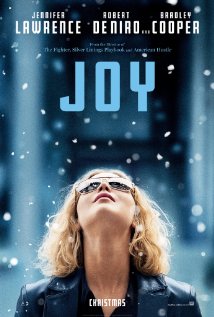
JOY
US, 2015, 124 minutes, Colour.
Jennifer Lawrence, Robert De Niro, Bradley Cooper, Edgar Ramirez, Diane Ladd, Virginia Madsen, Isabella Rossellini, Dascha Polanco, Elizabeth Rohm, Susan Lucci, Laura Wright, Ken Howard.
Directed by David O. Russell.
Joy is a rather generic name for a film. We might expect experiences of joy and, by contrast, experiences of sadness. But Joy is the name of the central character, based on actual person, Joy Mangano. With her invention of the squeezing mop, the title of the film could have been Mop.
Audience expectation is high with Jennifer Lawrence in the central role. She had worked with the director, David O. Russell on The Silver Linings Playbook and won an Oscar for best actress. She also worked with him on American Hustle, a small role, striking and Oscar-nominated. Here she is the central character. She also works again with Bradley Cooper as she did in the previous Russell films as well in the period drama, Serena.
In fact, the film begins with sequences from a black and white, very stolidly photographed and performed, soap opera. The audience needs to keep this in mind as we watch because Russell is very serious with his American dream drama, with its touches of nightmares, contrasting with the soap operas. Indeed, the soap opera continues throughout the film, later developments in colour and more sophisticated filmmaking, constantly watched by Joy’s mother, Terry, Virginia Madsen, a recluse after her divorce, living in her room, dependent on her television program.
We see Joy as a child, with her half-sister, Peggy, friends but with a touch of rivalry. Their father, Rudi, who owns a repair business, is played by Robert De Niro.
The screenplay then cuts out a lot of information (later to be taken up in flashbacks) and we find Joy, married and divorced, a mother of two children, working for an airline, a mortgage on her house, living with her grandmother and her reclusive mother, not many prospects in life. As she meets with her best friend, Marie, Dascha Polanco, we are treated to flashbacks about Joy, going to a bar, meeting the singer, Tony (Edgar Ramirez), then bonding, marriage, the years going past, two children, his not getting a satisfactory job, his living in the basement, Joy and Tony still good friends. And then her father wants somewhere to live and is put in the basement where he fights continually with Tony.
There is a development when Rudi makes an online dating connection, a widow called Trudi (Isabella Rossellini) and they hit it off. It is on a yacht cruise where they are forbidden to drink red wine which could stain the teak wood work, where they do drink it, spill it, and Joy mops it up, cutting her hand – but, having invented things in her childhood, gets her thinking about a mop that one needn’t have to handle but could be squeezed by an inner mechanism.
Audiences may be surprised that they are spending so much time in the development of the Mop, the production of the Mop, money loans, promotion of the Mop.
Trudi does give a loan although she has fixed ideas about business. When Joy tries to demonstrate the use of the mop outside K Mart, she is arrested. The local parish priest has gathered together a number of Hispanic women who need work and they combine to become the company who makes the Mops.
Tony has a connection with a producer at a television shopping channel, Neil, played by Bradley Cooper. By insistence and force of personality, Joy demonstrates the mop for Neil, persuades him to let her advertise – with the screenplay giving us an idea about the origins of these channels, the developments, the revolving stages, the process of filming, the number of phone calls, the business success.
The American dream becomes a nightmare when the salesman spoils the whole demonstration – with Joy then determined to do it herself, defying the advice for make-up and clothes, freezing at first, and then warming to the situation and the sales rocket.
That would be too good to be true. As has been said, the American dream has nightmares and there are all kinds of clashes, especially with her sister Peggy who wants to control things with the support of her father, and issues of bankruptcy especially with Trudi, confrontation of the factory owners in California, the discovery of fraud from Texas – and Joy, studying the documentation, confronting the enemy, succeeds and her dreams come true.
Whether they had been put off by a such a study of Mops, a number of commentators decided that the film was rather trivial and silly – but, it seems they have underestimated Jennifer Lawrence’s screen presence and performance, the strength of the supporting cast, the value of the American dream for someone who might have been very ordinary and unachieving American housewife.
1. The title? The character? Joy and sadness in her life?
2. The director, his work, collaboration with the main cast?
3. An American story, the American dream – with nightmares?
4. The introduction, the narration by Mimi, her comments on Joy and her life, her prospects, and her comments even after her death? The young children, the half sisters, Joy and her inventions, her parents, reactions, the separation and divorce?
5. The use of soap operas throughout the film, the initial scenes, stilted, black and white photography, performances, soap opera situations? Themes, rivalries, relationships? The later sequences in colour, more sophisticated film-making, the same stories? Terry and her continued watching of these soap operas? The director’s comment on soap operas and his story? Parallels, differences?
6. Terry and the plumbing needs, the arrival of Toussaint, his work – and everybody’s surprise that he and Terry make a couple?
7. The audience finding Joy suddenly married, Tony, the two children, her working for the airlines, being downgraded? The divorce, Tony living in the basement? Her relationship with her father, his repair service, the huge wall with his picture? His wanting to move in, the basement, the continued fights with Tony?
8. Rudi, character, his work, the repairs, the three wives, his relying on his daughter Peggy, her work to him, with him? His relationship with Joy, the doing
the accounts, his gratitude? The mortgages on the house? Her mother, reclusive, pampered, watching the television and the soap operas in her room?
9. Rudi, dating online, the comments from Joy, the connection with Trudi, their deciding to meet, the meal, hitting it off, Trudi’s story about her husband, Morris, and his wealth? His yacht?
10. Joy and Marie talking, assessing the situation, the occasion of the flashbacks?
11. The picture of the children, Joy growing up, going to the bar, the encounter with Tony, his singing, their talking, the bond between them, the marriage, her father and his criticisms just before the marriage ceremony? The years passing, the children, his hopes, being stuck, their bickering, the divorce, his living in the house – but their being good friends?
12. Trudi, inviting them all on the yacht, the caution about the red wine, on the sea, the drinking, the red wine and the stain, Joy mopping up, cutting her hand? Thinking about the mop, the drawings on her daughter’s wall, the physics of the mop, the twisting, the length of cotton and its absorption, in the washing machine? The plan?
13. Her meeting with Rudi, with Trudi, Tony present? The request? Trudi and her ideas about Morris, money and business? Her interrogation of Joy? The question about taking up the gun for a rival?
14. The loan, the plan, contacts with California, manufacturing, the prices going up, the making of the mop, Joy demonstrating it in front of K Mart, with her daughter, her friend, the arrest? Tony and his family passing by and the sense of humiliation?
15. Tony, his idea, going to the shopping television station, the background of Barry Diller and his setting it up? Meeting with Neil Walker? Having to wait, the end of the day, her insistence, going into the meeting, talking with Neil? Neil and his significant speech about the nature of television shopping, advertising, sales, people’s needs, the phone calls? Joy talking with him, the demonstration, his believing in her?
16. Shopping online, the studio, the revolving stages? And the demonstrations, Joan Rivers, the jewels? The phone calls, the sales, the numbers? Joy being impressed? Neil and his offer? The main seller, the possibilities of making the mops, the local priest, the number of Hispanic women that he rounded up, their working on making the mops?
17. Everybody watching the television at home, excitement, the main salesman and his fiasco?
18. Joy, her demonstration, the preparation, clothes and make-up, freezing, there are urging her to talk, Marie phoning and listening Joy’s attitude, the plug, the energy, Joy making the mop personable, the focus on her hands, the numbers, the excitement?
19. The phone call, Mimi and her death, her optimism for Joy, Joy losing her hope? The funeral?
20. The funeral, Rudy and his reaction, Peggy going to California, paying the $20,000 without authorisation? Joy and her meeting with the family, her strong, hardline?
21. Neil, Joy, friendship, commercial friends – and potential commercial enmity? Neil coming in later years and his warning about plans for Joy?
22. Joy going to California, confronting the businessman, going to the toilet, getting out the window, observing everything, the moulds, the police coming, the arrest?
23. The meetings of the family, her daughter present, the sense of failure, bankruptcy? Rudi and his attitude, plain himself? Trudi and attitude towards business? Peggy and her jealousy?
24. Joy’s studying the documents, the information about the Texas boss, the decision to go to Dallas, the hotel room, his visiting, his threats, her hold over him, the phone call to Hong Kong about the royalties, the exposé of the fraud, urging the Texan to retract, the extra money, his signing the document’s?
25. The change over the years, the children growing up, her caring for her parents, a company, fashionable clothes and has style, sitting in the office, looking at the cutouts from her childhood, kneels visit and talk about the future? Joy’s inventions, a company, his story, the fulfilment of the American dream?
Published in Movie Reviews
Published in
Movie Reviews
Tagged under
Saturday, 18 September 2021 19:59
Nightingale/ 2014
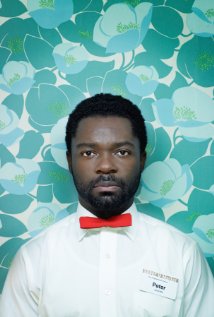
NIGHTINGALE
US, 2014, 83 minutes, Colour.
David Oyelowo.
Directed by Elliot Lester.
Nightingale is an HBO special, an 83 minute drama, a monologue by its star, David Oyelowo, British, making a success of his career in the United States, especially with his portrayal of Martin Luther King in Selma. For his performance in Nightingale, he was nominated for both Golden Globe and Emmy.
The screenplay is by Frederick Mensch.
While there is only one character in the film, the writing and the photography have the protagonist, Peter Snowden, continually on the move within his home, sometimes moving outside, with his continually talking to himself, to a video camera, to people calling on the phone. While this requires some concentration, the performance and the editing and pace keep most audiences interested.
Peter Snowden, wearing his name tag at home, worked at a supermarket. We see him in his house, preparing a meal and eating it. There is mention of his mother – and we notice a splash of blood which he cleans from his glasses, listening to him as he begins to rant, and thinking that he has killed his mother. This is confirmed as he puts a towel against the door of her room, eventually enters, is overcome by the smell, wraps her in a blanket, puts her in the boot of his car and takes her away and dumps her. With phone calls from his sister and from his mother’s friends, he continues to pretend that she is either out playing bridge or is feeling unwell and cannot be disturbed. In his talk about his mother, he continually praises her, contrasting with her loss of love for his sister who has married and lives away. He makes the point that he is the good son, staying at home, and looking after his mother. And this is given religious value by his praying, quoting the Scriptures, talking about Jesus.
The other thing that is quickly introduced is his friendship with Edward, his buddy from military days, inseparable 18 years earlier but, after leaving the army, growing away from each other. It is clear that Peter is infatuated with Edward, phoning him, pleading, leaving messages, angry with Edward’s wife Gloria whom he accuses of deliberately blocking the calls. He plans to invite Edward to a meal in several days time, is giving considerable thought to the menu, the choices, and preparing the table, preparing himself, taking off his beard, trimming himself, the elaborate testing of what clothes to wear, and then his waiting and waiting for Edward to arrive, finally calling, making many excuses for his not being present.
There is a lot of emotional talk to the audience and to the video cameras about Edward, what a wonderful person he was, the only person for Peter, and is finally offering to drive away with Edward into their future.
The film uses a lot of variety in Peter and his change in appearance, eventually shaving his head. He has meals, showers, is in his underwear, is in different clothes, eventually tidying up his mother’s room, beginning renovations and painting.
He reads a letter from his mother’s friend, Mrs Carruthers, and is angry at her comments about him. She also phones and he puts her off, suggesting that she write. There is another phone caller concerned about his mother with Peter angry at him.
He has plans for sending his mother on a trip, persuading his sister to send the money to him, so he can buy the ticket and be a surprise for his mother.
Eventually, after trying to buy things online, including a coffeemaker, and a vanity mirror, he is told that his finances are running out and he is angry with the online clerk.
He becomes more and more aware of what has happened, tells that or his sister that she will read about him in the paper, is angry with an intruder at the door, but finally gets a gun, knows that the police are outside the house and that he will defend himself.
The film is a strong portrait of a man unravelling – and a reminder that so many people living alone, with various traumas, with issues with their parents, sexual orientation, can finish up in siege situations.
His final message to those listening to his videos is that they should embrace the people that they love, instantly, and makes it very clear to them that this is the most important thing.
Published in Movie Reviews
Published in
Movie Reviews
Tagged under
Saturday, 18 September 2021 19:59
Humbling, The
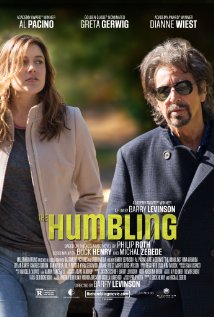
THE HUMBLING
US, 2014, 112 minutes, Colour.
Al Pacino, Greta Gerwig, Nina Arlanda, Dylan Baker, Charles Grodin, Dan Hedaya, Billy Porter, Kyra Sedgwick, Dianne Wiest.
Directed by Barry Levinson.
The Humbling is an opportunity to see Pacino as he moves towards his mid-70s, a film for his fans rather than the general public. The film has been directed by Barry Levinson, writer turned director for film and television, winning an Oscar in 1988 for Rain Man.
Pacino plays an actor past his prime, reciting the lines about the ages of man from Shakespeare’s As You Alike It – and the film ending with the death scene from King Lear. The actor is disturbed, has nightmares – including finding himself, like Michael Keaton in Birdman, out in the street and unable to get back into the theatre. During his performance, he falls prostrate into the orchestra pit. This leads him to an institution and therapy.
At the institution, he comes across a fan who says everything is perfect in her life except for the fact that her husband has abused her daughter. She is mad and continues to make proposals that the actor become a hitman for her.
Therapy is conducted with Dylan Baker, sometimes in person, sometimes by Skype.
Matters become more complicated when he is visited by the daughter of a fellow actress, Dianne Wiest, played by Greta Gerwig. She starts to take over his life and, though a lesbian, with a jealous partner, a lecturer played by Kyra Sedgwick, she has an affair with the actor. He is taken to task by her parents – and at the end, we realise that she has something of a life of her own and that we have been watching her through the eyes of the actor.
His agent is played by Charles Grodin and has an offer of being in a commercial or doing King Lear on stage. He opts for the latter – and, with Lear, he has his own death scene.
1. An actor in crisis? Mental, career, identity?
2. The film based on a novel by Philip Roth, Roth and his issues, the adaptation?
3. The title, the experience of Simon Axler? Humiliated by himself, by others, audiences?
4. The world of the theatre, the mental institution, the home, woods, the vet, hospital… Simon’s world?
5. The Shakespearean basis: the opening, Simon rehearsing, the close-ups in the two mirrors, the speech from As You Like It, the character of Jacques, the quote, the Seven Ages of Man? The end, the performance of King Lear, Simon as a Lear on stage and in life? His masks of comedy, tragedy? The finale, his death?
6. The close-up at the beginning, Simon and his reflections, rehearsing? His nightmare, in make-up, outside the theatre, looking in, the posters, his being refused entry? Waking up? His cue, his speech, the performance, falling into the pit, audience reaction?
7. Going to the institution, the meetings with Dr Farr, the Skype contacts? Simon telling his story, the doctor listening, the doctor making suggestions, Simon’s reflection? The nature of the therapy, probing Simon’s character?
8. The group therapy, the room, pills and his sleeping, the group of and his very long speech, self-knowledge? The comments to the group about acting, his proneness to perform for an audience anywhere? The Skype camera and his comment about performing to camera?
9. The encounters with Sibyl, seemingly normal, joining him, the meal, befriending? The talk, a perfect world, a perfect husband? The story of her discovering her husband molesting their daughter? Wanting to kill him? Offering Simon the job? The memories of seeing him in a film? His refusal, his claiming that it was a fiction? The continued visits, in the woods, offering cash, not understanding refusing to understand what he was saying? Continuing with fan letters? Her killing her husband, the arrest, on television? The police and the interrogation of Simon? The dangers of this kind of mad stalker?
10. Gerry, Simon’s agent, collecting him, going to his house, only downstairs after 14 years? The option for the advertisement and King Lear ? Simon’s choice, Gerry in the audience, applauding, saying that it was the greatest moment?
11. The arrival of Pegeen, her age, at the University, the story of a long crush, his acting with, away from her parents, not informing the? Lesbian, relationship with Louise, previously with Prince? Her being with Simon, the sexual relationship, questioning sexual choices? Coming to the house, and his relationship, going shopping, spending money, heating the swimming pool, the control? Simon and his wanting to have a relationship, the talks with the therapist? The housekeeper, her comments – and later the inventory of the sexual material?
12. Louise, frantic, outside the house, anger, the relationship with Pegeen, the sexual relationship, Louise and her dependence?
13. The arrival of Priscilla, turning into Prince? The transgender surgery, his wanting Peggy to be present, her reluctance? The pathos of his visits, Simon’s response? Saying that her former lover no longer existed?
14. The visit of her parents, memories of the past, the mother and her denunciations, running over the cat, taking it to the vet, Simon’s injection and his slurred speech, the mother’s reaction? The nightmare, meeting the mother, talking about Simon and their affair, her marriage, the months, Pegeen being his daughter, resembling Simon?
15. The variety of nightmares, compared with reality, the girl at the bar and his sitting at the stairs, dreaming of the tour of the house? The attraction between the two women and their behaviour?
16. The effect on Simon, self reflection, the offers, thinking about the ad, refusing, deciding on King Lear?
17. Rehearsals, performance, imagining Pegeen’s mother?
18. Pegeen, the breaking with Simon, her more realistic approach to life, the harshness of the break?
19. The end, the performance, the knife, the bewilderment of the actors, apprehensive audience, his stabbing himself, his rising up, the blood, collapse and
death?
20. Al Pacino, an actor reflecting on life, despairing?
Published in Movie Reviews
Published in
Movie Reviews
Tagged under
Saturday, 18 September 2021 19:59
Oklahoman, The
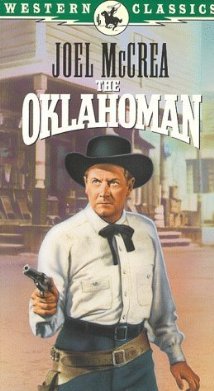
THE OKLAHOMAN
US, 1957, 80 minutes, Colour.
Joel Mc Rea, Barbara Hale, Brad Dexter, Gloria Talbott, Michael Pate, Verna Felton, Douglas Dick, Esther Dale, Ray Teal.
Directed by Francis D. Lyon.
Joel Mc Rea has taken his place as one of the chief actors in Hollywood westerns. After a career as a man about town and then an action adventurer in the 1930s, he moved into smart comedies in the 1940s, and then, especially in the 1950s, into westerns where he became, along with Randolph Scott, one of the iconic upright men of the West.
This is particularly true of this film, a small film but beautifully photographed, a western where he is a doctor moving out West when his wife dies in childbirth and he stays in the local town in Oklahoma to bury her and then decides to stay to work as a doctor. A kindly widow whose two sons died in the Civil War takes them in and acts as a grandmother to the child – Esther Dale.
The young Indian woman, Gloria Talbott, comes to look after the little girl and falls in love with the doctor. There is also a ranch owner, a widow, played by Barbara Hale, whose feisty mother is forever dropping hints about marriage.
There are complications in the town which is partly owned by a rancher, Brad Dexter, one of the Magnificent Seven, who becomes more interested in oil when it is found on local properties, especially that owned by an Indian who has been granted land after the uprisings. He is played by Michael Pate.
Needless to say, the swaggering owner becomes violent, and the doctor has to take a stand, almost like High Noon – but, interestingly, in the previous shootout, a villain is wounded in the arm and his target does not die. The doctor is also wounded – but lives another day.
Popular Western ingredients with a difference.
1. An engaging Western? A western with the difference? The focus on a doctor, his role of healing before the use of guns?
2. The widescreen photography, the Oklahoma countryside, the town of the 1870s, boarding house, doctor’s surgery, the hotels, the homes of the ranchers? The musical score?
3. Joel Mc Rea and his career in westerns, a veteran, an icon, the decent upright man of the West?
4. The opening, the birth of Louise, the death of the wife in childbirth, the friends and their support, going to the town, John burying his wife, Mrs Fitzgerald and welcome, his decision to stay because of the grave, for his daughter, working in the town as a doctor?
5. the years passing, his reputation, the good doctor, the range of patients? Mrs Fitzgerald, her kindness, the death of her sons in the war, becoming a grandmother to Louise, support for John? Louise running in front of the carriage, Mrs Fitzgerald feeling too old, wanting Maria to help? Mrs Fitzgerald, the
collapse, satisfaction in life with Louise and John, her death?
6. The role of the Indians, a more personal approach in the dialogue, characters acknowledging Indian rights, the battles, the treaties, themes and settling the land, ownership, rights, families? Charlie an exemplary Indian? Always telling the truth? His son? Coming to the doctor, the son and swallowing the oil? The stomach pump?
7. The indication of oil, the discovery of petroleum, in the western states? Dobie, his power in the town, his brothers and entourage, the confrontation by Randall, his not wanting to shoot him, the brother drawing, being wounded, and Randall surviving? The information about the oil, send his brother to scout the property? Finding oil on Indian land? Dobie and his ambitions?
8. Maria, 18, Charlie’s daughter, coming to work in the house, sharing the meetings, the bond between them? Rumours in the town? Mrs Barnes, outspoken, matchmaking, criticising her daughter? The birthday party, Dobie and his dancing with Maria, belittling her in his speech, John to her defence, almost fight, the news about Charlie and his brother?
9. Charlie, seeing the brother at the swamp, being shot at, hiding, throwing the knife, giving himself up?
10. The atmosphere in the town, the sheriff and his control, Dobie and the drinking in the bar, the threats to Charlie? John going to the sheriff, the discussion about Charlie safety, getting his release?
11. Ann, widow, her large range of cattle, her liking for John, and his? Her jealousy of Maria, coming to his office? Her later apology and farewell to Maria?
12. John, deciding to go to Oklahoma City, to get the Indian agent, his horse being shot?
13. John and his realisation about the oil, the town divided, half supporting Dobie, half afraid of him?
14. John and challenging him about the oil, explaining to the people, Dobie wanting a high noon stand-off, killed, John wounded?
15. Charlie free, Maria leaving, Ann’s apology, marriage and happy ending?
Published in Movie Reviews
Published in
Movie Reviews
Tagged under
Saturday, 18 September 2021 19:59
7th Heaven
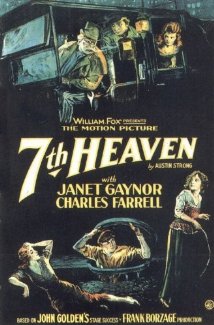
7th HEAVEN
US, 1927, 110 minutes, Black and white.
Janet Gaynor, Charles Farrell, Ben Bard, Albert Gran, Gladys Brockwell, Emile Chautard.
Directed by Frank Borzage.
7th Heaven is considered a silent classic, coming at the end of the silent era and winning Oscars for the director and the Janet Gaynor along with Sunrise, for 1928.
The story has a French setting, in Paris, prior to World War I, a focus on poverty with two young women (whose parents are away travelling and are disappointed in their daughters), forced to go on the streets because of poverty. A young man, played by Charles Farrell, who works in the sewers befriends the younger daughter, played by Janet Gaynor, and to save her from the police says she is his wife.
The film shows them happy together but the tone of the film changes completely with the outbreak of the war, the young man going off to war, some vivid battle sequences, his being wounded, his coming home – and facing his future with his wife.
An abbe crosses paths with them several times, supporting the woman, giving the young man some medals even though he does not believe. He intervenes several times to help them both, a traditional picture of a kindly priest. Matters come to a head at the end when the woman is distraught at news of her husband’s death in the war, only to find that he has survived – the medals, faith and God. A standard American portrayal of a priest.
1. A silent classic? Awards? Janet Gaynor and her reputation? Oscars?
2. The end of the silent era, silent film techniques, style in photography, light and shade, acting and performance, the captions, the effect of the fixed camera for dramatic impact?
3. French story, the French settings, Paris, the city, the period?
4. The atmosphere of poverty, homes, the workers, the streets, the police?
5. Diane and her sister, the bond between them, tensions? The family background, the absent parents? Poverty? Rivalry? Suffering?
6. Diane sister, her life, prostitution, men? The domination of Diane? Challenges and confrontations?
7. Chico, his work, genial, the sewers? Diane and the situation, his stepping in, claiming her as his wife, marriage, their life together, her happiness?
8. The role of the police, checking with Chico, the interrogations, suspicions about Diane?
9. The parents, return, the reactions, disowning their children?
10. Ordinary life in Paris, the outbreak of World War I, the vast changes? Diane in Paris, waiting, her ordinary life?
11. The war sequences, and strongly staged? The dangers, the bombardments? Chico and his wound?
12. The role of the priest, his concern for Diane, helping, the medals, even though he did not believe? His survival?
13. Chico, his injuries, the return, the effect on both of them – acceptance, their future?
Published in Movie Reviews
Published in
Movie Reviews
Tagged under
Saturday, 18 September 2021 19:59
Escobar: Paradise Lost
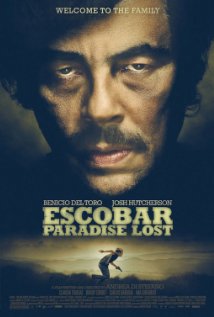
ESCOBAR: PARADISE LOST
France/Spain/Belgium/Panama, 2014, 120 minutes, Colour.
Josh Hutcherson, Benicio Del Toro, Claudia Traisac, Brady Corbett, Ana Girardot, Carlos Bardem.
Directed by Andrea di Stefano.
This is a sketch of drug lord, Pablo Escobar, from Colombia. it seems something of a sketch and might have been amplified to a miniseries.
As it is, Benicio del Toro gives a strong performance as Escobar, politician, drug dealer par excellence, some charm on the surface, absolute ruthlessness underneath.
The story is told from the perspective of the young American, played by Josh Hutcherson of The Hunger Games, who went with his brother, played by Brady Corbett, and his wife to set up a beachside home – but who is attracted to Escobar’s niece, Maria, and drawn into the ambit of Escobar, finally involved in the plot to hide Escobar’s wealth, from which he was not expected to survive.
For those who want something of the background of Escobar and his activities.
1. Audience interest in and knowledge of Pablo Escobar, Colombia, the drug world, cartels, shipment to the United States? Judgement on drug production and distribution, the drug lords, the usage of jugs in the US and pandering to this usage?
2. Colombia, the 1980s? Americans, travelling, the locations, the coast, the mansions of the drug lords, the surf, the countryside and crops? The musical score?
3. The title, Escobar in himself, his life, gains, losses?
4. The introduction to Nick, with Dylan and his wife, the brothers, their ambitions, setting up their house, the surf, lifestyle?
5. Maria, meeting Nick, the romance, stories about her uncle, the status, her personality, love?
6. Escobar and his politics, his reputation, wealth, charities, seemingly benign? His surface charm? The depths of his ambition, cruelty, using people, no scruple, violence, the world of cocaine, preparation, staffs, their lives? Distribution?
7. Nick, young, his character, love for Maria? Invitation to the house? Comfortable, accepting it, being charmed by Escobar? Knowing the truth? Being trapped within this world? Engagement? Escobar and his acting as a patron and mentor, the influence, the hold over him?
8. The media, 1991, the expose and its effect?
9. Escobar, his reaction, a war with the government, his exercise of cruelty? Controlling Nick, the escape plan, and his not to escape?
10. Escobar, his plan for his wealth, hiding his resources, the role of Nick, travelling, into the mountains, Nick witnessing the killings, escaping?
11. The drive, the track, the contact, hiding the wealth, Nick to die, his escape?
12. The savagery of the deaths of Dylan, Anna the child?
13. Nick’s escape, Maria, the shootings, going to Medellin?
14. The after effect of this episode and notoriety of Escobar?
Published in Movie Reviews
Published in
Movie Reviews
Tagged under
Saturday, 18 September 2021 19:59
Jack the Bear
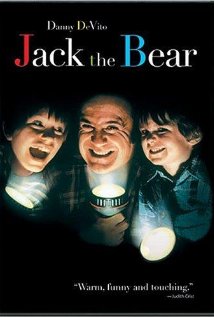
JACK THE BEAR
US, 1993, 99 minutes, Colour.
Danny De Vito, Robert J.Steinmiller Jr, Miko Hughes, Gary Sinise, Art La Fleur, Stefan Gierasch, Erica Yohn, Andrea Marcovici, Julia Louis- Dreyfus, Reese Witherspoon, Bert Remson, Lee Garlington.
Directed by Marshall Herskovitz.
Jack the Bear is a family drama, with touches of comedy, a story of the 1970s from the perspective of 20 years later.
Danny De Vito portrays a television personality, the host of a local horror program which requires him to get made up, pretend to scare his audiences, but is extremely popular. His wife has died and he is left with the responsibility for his two sons, the younger, Dylan, Miko Hughes, with the responsibility on his older son, Jack The Bear, played by Robert J. steinmiller Jr.
In the neighbourhood, is a staunch right-wing neo-Nazi type, played by Gary Sinise.
The plot is complicated with Jack the Bear having to take responsibilities, care of his brother who is eventually abducted, attracted to a young girl at school, played by Reese Witherspoon.
It gets too much for the father, his drinking, and especially his denunciation of the extreme right-wing types on his television program – with Julia Louis- Dreyfus as his studio assistant.
For fans of Danny De Vito and for those who appreciate stories of children growing up and taking responsibility.
1. A film about children? Parents? Death and greeting? Rites of passage?
2. The title, the reference to the son, his age, name, growing up, caring for his brother, dealing with his father, the in-laws, the friends, Karen?
3. The 1972 setting? The film 20 years after the events? New York State, Syracuse, the town, the streets, the neighbourhoods, school? The musical score?
4. Danny De Vito’s John, the focus, his age, character, husband, father, his drinking, the clash with the in-laws? Death of his wife, grief, inability to cope? Relationships?
5. John and his show, television in 1972, host, his costume, the monsters, performance, audiences, enjoying the show? The show, the effect for his sons, for the kids, the neighbours?
6. Jack, his age, having to cope, relationship to Dylan, the bonds? His father, at home, absent, behaviour, drinking, erratic? The personal responsibility – and his learning?
7. Jack at school, Karen, attractive, the bond, the family, escorting her to the door, the meal, the enjoyment, the difficulties and the break?
8. Norman as a neighbour, on his own, his reactions, negative, the dog, monster? Jack, the complaints, the denunciations?
9. The studio, his drinking, the rant against the Neo- Nazis, the effect?
10. Peggy, the character, her work with John, support, with the kids, the other staff, fearing his collapse and failure?
11. Norman, his behaviour, antagonism? The abduction of Dylan? The reaction, the search, the motivations? The rants? The boys return?
12. The picture of the in-laws, the visits, the reactions to Jack, to John, their concern for the children?
13. Final promises, hope?
14. The picture of family, the comic touches, the serious touches, grief and coping, antagonistic neighbours and society? A memoir?
Published in Movie Reviews
Published in
Movie Reviews
Tagged under